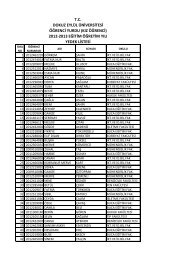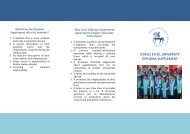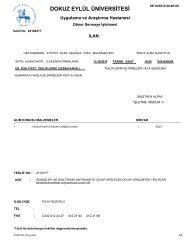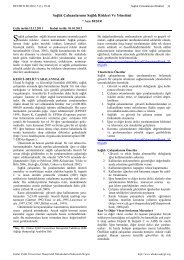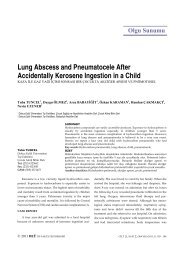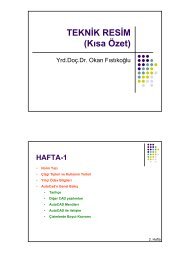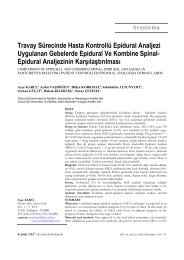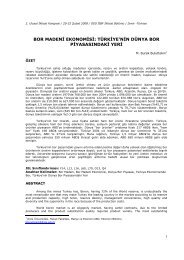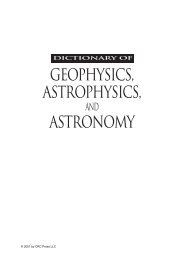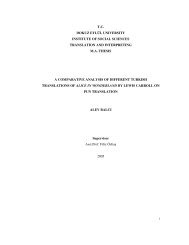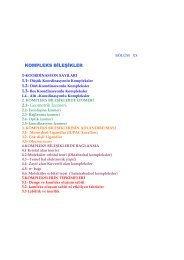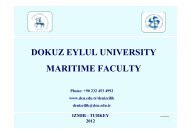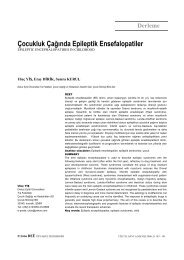the ideology of lexical choices in the turkish translations of oliver twist
the ideology of lexical choices in the turkish translations of oliver twist
the ideology of lexical choices in the turkish translations of oliver twist
You also want an ePaper? Increase the reach of your titles
YUMPU automatically turns print PDFs into web optimized ePapers that Google loves.
Consider<strong>in</strong>g adaptation as negative corresponds to Lawrence Venuti’s ideas<br />
on domestication (as opposed to foreignization). Domestication is a translation<br />
strategy <strong>in</strong> which a transparent, fluent style is adopted so as to dim<strong>in</strong>ish <strong>the</strong><br />
strangeness <strong>of</strong> <strong>the</strong> source text for <strong>the</strong> target culture readers.<br />
Be<strong>in</strong>g fervently critical <strong>of</strong> domestication, Venuti argues that this strategy is<br />
“an ethnocentric reduction <strong>of</strong> <strong>the</strong> foreign text to target language cultural values,<br />
br<strong>in</strong>g<strong>in</strong>g <strong>the</strong> author back home” (1995; 20). He also associates domestication with<br />
<strong>the</strong> target culture’s “narcissistic experience <strong>of</strong> recogniz<strong>in</strong>g <strong>the</strong>ir own culture <strong>in</strong> a<br />
cultural o<strong>the</strong>r” (1995; 15). He is <strong>in</strong> favor <strong>of</strong> <strong>the</strong> foreignized <strong>translations</strong>, which<br />
“signal <strong>the</strong> l<strong>in</strong>guistic and cultural differences <strong>of</strong> <strong>the</strong> foreign text” (1995; 311).<br />
Therefore, <strong>in</strong> Venuti’s view, a domesticat<strong>in</strong>g strategy preserves <strong>the</strong> cultural<br />
peculiarities whereas a foreigniz<strong>in</strong>g strategy obliterates <strong>the</strong>m.<br />
However, Paloposki and Oitt<strong>in</strong>en do not seem to agree with Venuti’s negative<br />
views on domestication. Accord<strong>in</strong>g to <strong>the</strong>m, translation always <strong>in</strong>volves <strong>the</strong> act <strong>of</strong><br />
domestication as when <strong>the</strong> text is translated; it becomes part <strong>of</strong> <strong>the</strong> target-language<br />
culture and literature. S<strong>in</strong>ce translation is carried out for target culture readers, it is<br />
pretty natural for translators to take <strong>the</strong>ir assumed views and ways <strong>of</strong> understand<strong>in</strong>g<br />
<strong>in</strong>to account. They argue that what <strong>the</strong> translator does while domesticat<strong>in</strong>g is to<br />
shape <strong>the</strong> text <strong>in</strong>to a credible whole for <strong>the</strong> target culture readers (Paloposki &<br />
Oitt<strong>in</strong>en, 2001; 387). They also elaborate on commonly domesticated elements as<br />
well as <strong>the</strong> reasons beh<strong>in</strong>d domestication. As <strong>the</strong>y put it, names, sett<strong>in</strong>gs, genres,<br />
historical events, cultural or religious rites or beliefs are among <strong>the</strong> commonly<br />
domesticated elements <strong>in</strong> <strong>the</strong> translation process. As for <strong>the</strong> reasons, <strong>the</strong>y state that<br />
domestication is carried out for m<strong>in</strong>ority or majority cultures, for political ideals, for<br />
religious beliefs (which is seen <strong>in</strong> <strong>the</strong> case <strong>of</strong> <strong>the</strong> Turkish versions <strong>of</strong> Oliver Twist),<br />
for political pressures, censorship or differ<strong>in</strong>g moral values (ibid.).<br />
1.3.3.3. Lefevere’s Concept <strong>of</strong> Patronage <strong>in</strong> relation to Ideology<br />
Lefevere po<strong>in</strong>ts out that literature and translation can and should be analyzed<br />
<strong>in</strong> systematic terms. For that reason, he chooses to make use <strong>of</strong> <strong>the</strong> concept <strong>of</strong><br />
‘literature as system,’ which is <strong>in</strong>troduced <strong>in</strong>to <strong>the</strong> doma<strong>in</strong> <strong>of</strong> literary studies by <strong>the</strong><br />
11



